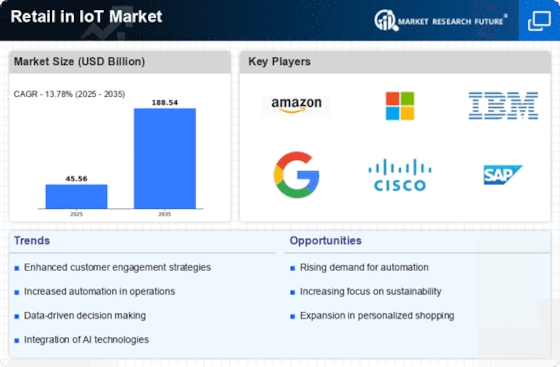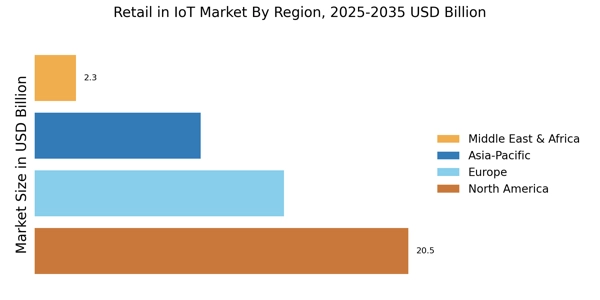Data-Driven Decision Making
The Retail in IoT Market is increasingly driven by the ability to harness data for informed decision-making. Retailers are leveraging IoT devices to collect vast amounts of data on customer behavior, inventory levels, and sales trends. This data enables retailers to optimize their operations, enhance customer experiences, and tailor marketing strategies. According to recent estimates, the integration of IoT in retail could lead to a 20% increase in operational efficiency. As retailers adopt advanced analytics and machine learning algorithms, they can gain insights that were previously unattainable, thus positioning themselves competitively in the Retail in IoT Market.
Cost Reduction and Efficiency Gains
Cost reduction remains a pivotal driver in the Retail in IoT Market. By implementing IoT solutions, retailers can streamline operations, reduce waste, and enhance supply chain efficiency. For instance, smart inventory management systems can minimize overstock and stockouts, leading to significant cost savings. Studies suggest that IoT-enabled supply chain solutions can reduce logistics costs by approximately 15%. As retailers seek to improve their bottom line, the adoption of IoT technologies is expected to accelerate, further transforming the Retail in IoT Market.
Enhanced Security and Loss Prevention
Security concerns are paramount in the Retail in IoT Market, driving the adoption of IoT solutions for loss prevention. Retailers are increasingly deploying IoT-enabled surveillance systems and smart sensors to monitor store environments and detect suspicious activities. These technologies not only enhance security but also provide valuable insights into customer behavior. The implementation of IoT security solutions can lead to a reduction in theft and fraud, which is estimated to cost retailers billions annually. As security becomes a priority, the Retail in IoT Market is likely to see a surge in demand for innovative security solutions.
Personalization and Customer Experience
In the Retail in IoT Market, personalization has emerged as a key driver of consumer engagement. IoT technologies allow retailers to gather real-time data on customer preferences and shopping habits. This information can be utilized to create personalized shopping experiences, such as targeted promotions and customized product recommendations. Research indicates that personalized marketing can increase customer loyalty by up to 30%. As retailers continue to invest in IoT solutions, the ability to deliver tailored experiences will likely become a critical differentiator in the Retail in IoT Market.
Sustainability and Environmental Responsibility
Sustainability is becoming a crucial driver in the Retail in IoT Market as consumers increasingly demand environmentally responsible practices. IoT technologies enable retailers to monitor energy consumption, optimize resource usage, and reduce waste. For example, smart lighting and HVAC systems can significantly lower energy costs while minimizing environmental impact. Research indicates that retailers adopting IoT solutions for sustainability can enhance their brand image and attract eco-conscious consumers. As the focus on sustainability intensifies, the Retail in IoT Market is expected to evolve, with more retailers integrating IoT technologies to meet these demands.

















